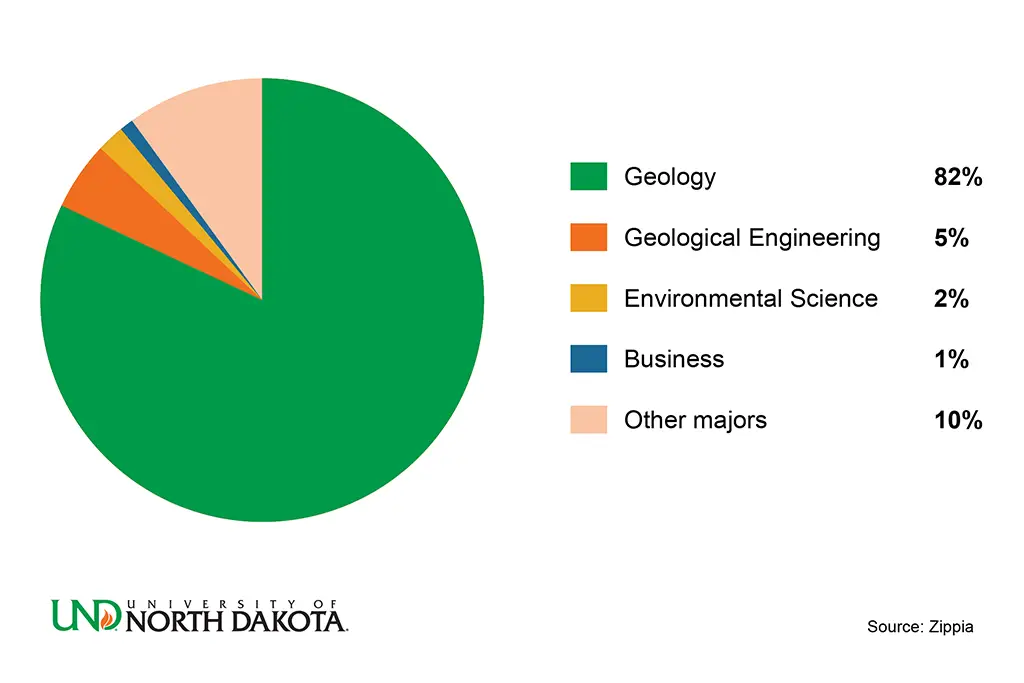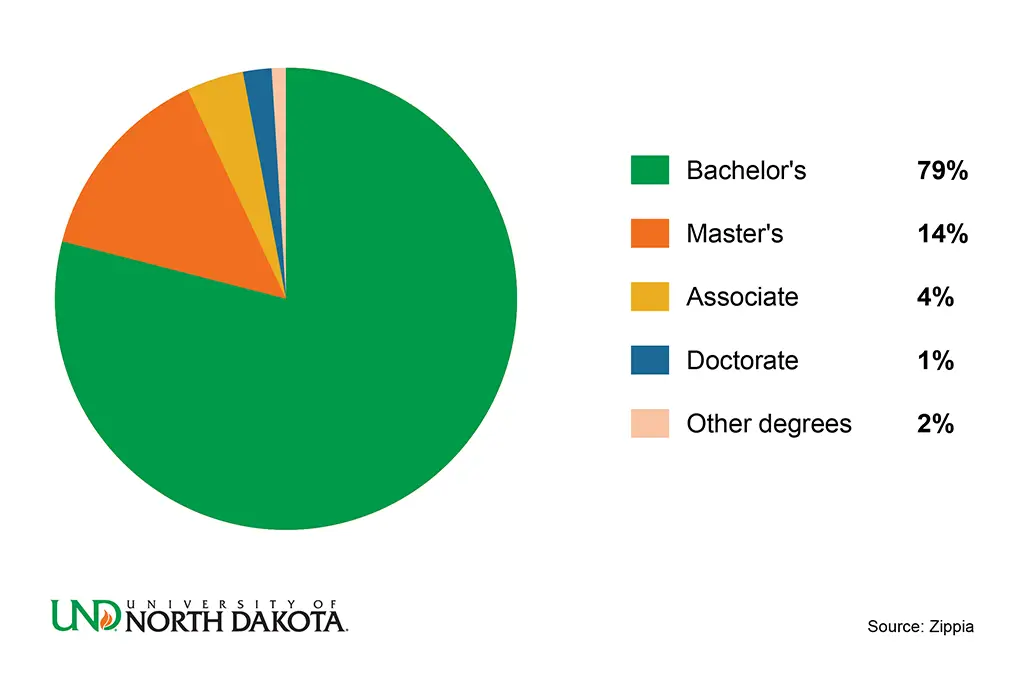
How to Become a Geologist: 6 Steps to Start Your Journey
Reviewed by Sven Egenhoff, Ph.D.
Becoming a geologist starts with earning a bachelor's degree in geology, followed by hands-on field experience.
Request Information
Depending on where you work, licensure or certification might be the final step to unlocking your full potential in the field.
Geologists are like detectives working on a case about Earth. By piecing together clues from rocks, they reconstruct the history of our planet, stretching back nearly 4.6 billion years. But geology isn't just about understanding the past—it also impacts our everyday lives. For example, the rare metals in your smartphone, like lithium and tantalum, are made accessible through the work of geologists who study the natural processes that concentrate these elements into usable ores.
This blend of detective work and practical application makes geology a fascinating, meaningful, and rewarding career option. If you are curious about how to become a geologist, there are clear steps you can take to enter this exciting field.
Steps to Becoming a Geologist
Geology is a broad field that offers options for various aspects of understanding the Earth, including its history, processes, and the resources found in it. There is something for everyone: those captivated by dinosaurs, those intrigued by climate change, and even those passionate about resource management. However, in all cases, potential geologists must go through certain steps in order to pursue a career in this field.
Most Common Majors for Geologists
Becoming a geologist requires obtaining a bachelor's degree. According to data, the majority of geologists hold degrees in Geology (82%), followed by Geological Engineering (5%), Environmental Science (2%), Business (1%), and other majors (10%). This degree often serves as the primary prerequisite for geology positions across various industries. In fact, 79% of geologists have a bachelor's degree.
The foundational education obtained through a bachelor's degree in geology introduces students to topics such as:
- Mineralogy
- Petrology
- Structural geology
- Sedimentology and stratigraphy
- Geomorphology
At the University of North Dakota (UND), the bachelor's program in Geology goes much further than traditional classroom learning. With fieldwork as a core component of the curriculum, students regularly participate in trips to geologically significant locations. The program emphasizes practical skills, blending coursework with extensive hands-on laboratory work and field experiences.
In addition to regular field trips, UND offers unique opportunities for immersive learning. The program includes a five-week field camp, as well as the chance to join research projects that span the globe, from the deserts of the Southwest to the icy expanses of Antarctica.
Gain Field Experience
Geology is, at the end of the day, a science of observation and direct interaction with the Earth. That is why Herbert Harold Read, a renowned British geologist, once stated, "The best geologist is he who has seen the most rocks." This statement directly points to the importance of field experience in the education and development of a geologist, not just as they're beginning their career but throughout it all.
The intricate details of rock formations, mineral deposits, and geological structures can only truly be understood by seeing and touching them in their natural settings. Therefore, in the context of becoming a geologist, gaining field experience is an indispensable step.
By spending time in the field, aspiring geologists observe the diversity of geological phenomena firsthand, learn to recognize subtle differences in rock types, understand the significance of geological layers, and appreciate the processes that have shaped our planet over millions of years.
Fieldwork is integrated into UND's geology curriculum precisely because it is through these experiences that students transform from learners into true geologists. Whether it's studying volcanic rocks in Hawaii, examining sedimentary layers along the California coast, or exploring the ancient formations of Utah's National Parks, these experiences enable students to develop the keen observational skills that Read implied.
Consider Specialization
As you progress in your geology studies, the next step is deciding whether to specialize in a particular branch of the field. Geology is quite a broad discipline that encompasses in itself many subfields. Each of the subfields tends to focus on different aspects of the Earth and its processes. However, each one connects with others in one way or another.
For instance, a geochemist might study the chemical composition of rocks and minerals, while a geophysicist might focus on the physical properties and behaviors of the Earth's crust. Both specializations, though distinct, contribute to our understanding of geological processes and can intersect in meaningful ways.
Some other examples of specializations in geology include:
- Paleontology
- Sedimentology
- Geophysics
- Marine geology
- Spectral geology
- Biostratigraphy
- Geochronology
- Marine geochemistry
- Marine geophysics
Obtain a Master's Degree (optional but recommended)
Pursuing a master's degree in geology can significantly enhance one's career prospects and expertise. While only 14% of geologists have a master's degree, it equips you with the advanced skills and knowledge that employers look for in higher-level positions. Such a program provides students with a much deeper understanding of the topics explored during undergraduate studies and offers an even more extensive field and research experience.
Geologists by Degree Level
- Bachelor's: 79%
- Master's: 14%
- Associate: 4%
- Doctorate: 1%
- Other Degrees: 2%
Average Geologist Salary by Education Level
Even though it's not always required, having a master's can lead to quicker career advancement and higher earning potential. For example, geologists with a master's degree earn a median annual income of $130,919, compared to $107,263 for those with just a bachelor's degree. Those with doctoral degrees can earn $151,991.

With UND's Master's in Geology, you'll have access to state-of-the-art facilities like Leonard Hall, a premier research hub for fields such as geophysics, hydrogeology, and petroleum engineering. Additionally, the Wilson M. Laird Core and Sample Library offers an excellent resource, housing cores from nearly every oil well drilled in North Dakota. This direct access to extensive geological data and samples provides a unique opportunity to engage in high-level research that can take you to locations as remote and challenging as the Himalayas or Antarctica.
Get Licensed or Certified (if required)
Obtaining licensure or certification as a geologist is an important step in advancing your career, especially if you plan to work in roles that involve applied geology, where public and environmental health and safety are concerned.
Licensure, such as the Professional Geologist (PG) license, is granted by states and allows you to legally practice geology, demonstrating that you meet the necessary qualifications and have passed the required exams, like the ASBOG Fundamentals of Geology and Practice of Geology exams.
On the other hand, certification, such as the Geologist-in-Training (GIT) certificate, is an initial credential that shows you have begun the path toward full licensure, enhancing your credibility even before gaining full experience.
However, not all states require geologists to be licensed or certified. For example, in North Dakota, a formal license is not required to practice geology. This is also the case in several other states, including Colorado, Maryland, Michigan, Montana, Ohio, Oklahoma, Vermont, and more. On the other hand, many other states do require licensure, such as California, Texas, and New York, where you must pass the relevant exams to be recognized as a PG.
Before you begin practicing, it's best to check the specific requirements in your state.
Consider Obtaining a Doctorate
While only about 1% of geologists hold a Ph.D., pursuing a doctorate is a worthwhile decision for those aiming to lead in research, academia, or highly specialized industries. Doctoral candidates contribute new and original knowledge to the field of geology as well as often take on teaching responsibilities. This way, they earn valuable experience in instruction and mentorship that is essential for academic and leadership roles.
Faculty members like Jaakko Putkonen, who led a groundbreaking research project in 2018 that involved drilling 10-meter core samples of ancient ice in the Ong Valley of the Trans-Antarctic Mountains, exemplify the high caliber of mentorship and scholarly excellence that defines UND's Ph.D. program in Geology.
Putkonen's team, which included researchers from the Berkeley Geochronology Center and Vanderbilt University, as well as Marie Bergelin, a former UND geology graduate student now conducting post-doctoral research at the University of California-Berkeley, discovered that this ice dates back 5 million years.
Under the guidance of such accomplished scholars, students in UND's Ph.D. program are encouraged to engage in advanced research projects, contributing to significant scientific discoveries.
How long does it take to become a geologist?
Becoming a geologist can take different lengths of time, depending on your choices.
If you jump straight into the field after earning your bachelor's degree, you're looking at about four years of study, which prepares you for many entry-level roles. But if you're aiming higher—like wanting to specialize or lead in the field—a master's degree could add another two years, and a Ph.D. might take an additional 3-5 years on top of that. And then there's licensure, which could add more time depending on your state and your prior experience.
So, the timeline can stretch, and becoming a fully qualified geologist can take anywhere from four to ten years, depending on the level of education and specialization pursued.
Skills of a Geologist
Geologists rely on several technical and non-technical skills to fulfill their duties and overcome the challenges of their field. Some of the most essential skills they bring to the table include:
- Sharp analytical thinking
- Keen data interpretation
- Clear technical writing
- Critical observation
- Geospatial analysis
- Creative problem-solving
- Meticulous attention to detail
- Effective communication
- Strong team collaboration
Career Opportunities and Job Outlook
Geologists can find themselves in a variety of roles, each offering a different slice of the earth sciences. Some typical career paths include:
- Geologist
- Operations geologist
- Natural resource production and conservation specialist
- Environmental protection officer
- Senior geologist
- Maturation geologist
- Structural geologist
- Sedimentologist
- Stratigrapher
Looking ahead, the employment of geoscientists is anticipated to grow by 5% from 2023 to 2033, keeping pace with the average growth for all occupations. With about 2,200 openings projected each year, the field offers steady opportunities for new talent.
Conclusion
Everyone's approach to achieving success can be different, but in most fields—including geology—education, hands-on experience, and sometimes licensure or certification are the decisive factors. At UND, you'll find a place where your future in geology is nurtured through real-world experiences and expert guidance. We help you explore the Earth but, more importantly, discover your own way in it.
FAQs
Geology can be tough, with severe fieldwork at times and complex data analysis. But for those who love exploring the Earth, the challenges are part of the adventure.
Yes, geologists are sought after, particularly in sectors like energy, environmental protection, and mining, where their expertise is crucial.
Top-paying geology jobs are often in the oil and gas industry, where positions like petroleum geologists and senior exploration geologists can command high salaries.

